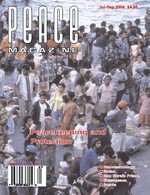
Peace Magazine Jul-Sep 2004, page 22. Some rights reserved.
Search for other articles by Jennifer Gearey here
Any man who wears a turtle brooch on a pin-striped suit does not lack imagination or spirit. And Vern Neufeld Redekop, 53, who directs the Conflict Studies Program at Saint Paul's University in Ottawa, is an expert in conflict-reconciliation. The worldwide demand for his seminars, from Bosnia to Taiwan, prompted Saint Paul University to urge Redekop create a department that addresses such issues. Since September 2003, the university has offered a Master's program in conflict resolution, for which Redekop designed the structure.
Today, his eyes smile when he talks about curing the world of violence. He believes that all conflict, great and small, stems from people feeling that their fundamental identity is somehow being threatened.
"If the core of our identity is threatened, we will have an emotional reaction, and fear takes over," says Redekop. Violence becomes a cycle that does not stop, for pride, hurt or anger gets in the way of forgiving. The cycle begins with a victim who is hurt and wants revenge. The victim-revengevictim-revenge cycle continues in an endless, self-perpetuating whirlwind of violence, unless someone in the long line of victims decides to end it by abandoning the need for revenge. That change begins with reconciliation. The best thing a victim can hear is an acknowledgement by the wrongdoer that "I am responsible for your pain," says Redekop. But human beings sometimes carry grudges, resentment, and anger to their deathbeds. Redekop admits that not everyone is ready to reconcile and abandon victim status.
"We don't naturally feel like reconciling when we start," says Redekop. "But we see others do it and we know it's possible. Reconciliation involves mastering our emotions. You need to bring in another level of consciousness that catches you when you make behavioral choices that could result in distress."
Redekop says human beings are meant to know other human beings on a profound level; that the human heart sends out signals that are picked up by other hearts, and that we should take more time not only to feel what others are projecting but to ensure that we are sending out the proper signals as well. It is possible to convert structures of violence into structures of peace. That requires a forced effort at first that develops into a habit over time.
With launch of Vern's book From Violence to Blessing (Ottawa: Novalis, 2003) which contains a foreword by Archbishop Desmond Tutu, the Saint Paul's program in conflict resolution has been attracting a wide spectrum of applicants.
That book reveals much about Redekop himself. He recalls his childhood in a town of 1000 -- Herbert, Saskatchewan -- with Dad as mayor and a date with a Mennonite Church every Sunday morning. He was naive about the wider world, he recalls, and had given up the notions of a sheltered Christian fundamentalist, adopting instead a universal ecumenism. His raw vision of the world began to crumble in 1969, when, as a science student at the University of Saskatchewan, he was chosen to head a delegation to an International Security Council meeting in New York.
"There was a point after that meeting that I didn't know if I wanted to live anymore," says Redekop. "My world was uprooted, my understanding of the world from the little community I came from was altered. The world was different, I was different."
He became unsure about his identity and the right path to follow -- whether to go into international relations or become a minister. Yet his experience at the Security Council meeting led him down a new life path that he still treads today--one that combines the mission of international peace with spirituality.
For 34 years his career has been an adventure: newspaperman, Christian minister, elementary-school principal, crime prevention analyst, professor, and writer. Whether it's to provide an outer or inner concept of peace, Vern Redekop is a man people can turn to for answers about fulfillment.

Peace Magazine Jul-Sep 2004, page 22. Some rights reserved.
Search for other articles by Jennifer Gearey here